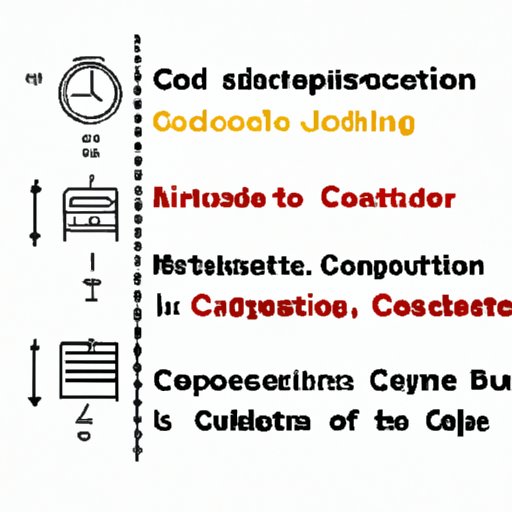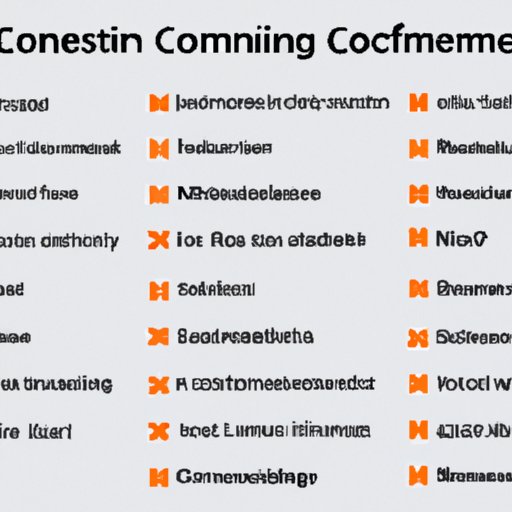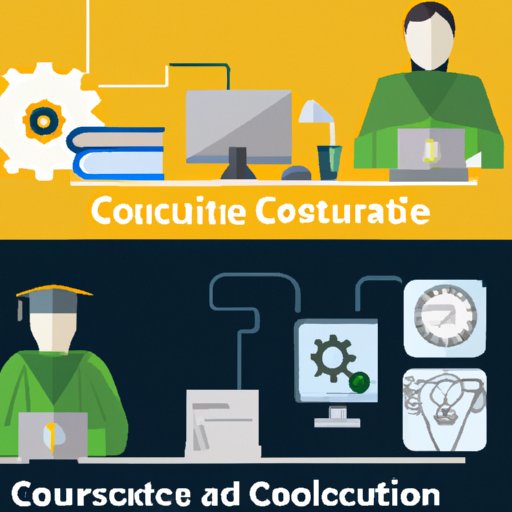Introduction
Computer science is a rapidly growing field, with new technologies and innovations being developed every day. As technology continues to evolve, so too do the opportunities for those who pursue a career in computer science. But how many years does it take to study computer science and become an expert?
Computer science is the study of the principles and techniques used to design, develop, and maintain software and hardware systems. It encompasses a wide range of topics, including programming languages, operating systems, database management systems, networking, artificial intelligence, and cryptography. In order to understand the time commitment required to learn computer science, it is important to first understand the various types of programs available.

Examining the Length of Time to Earn a Computer Science Degree
There are several levels of computer science degrees, from associate’s degrees to doctorates. The amount of time it takes to earn each degree depends on the type of program and the student’s individual circumstances. Generally speaking, the following are the most common lengths of time to complete each degree:
Bachelor’s Degrees
A bachelor’s degree in computer science typically takes four years to complete. During this period, students will take courses in programming languages, data structures, algorithms, operating systems, software engineering, and more. Some schools also offer accelerated programs that can be completed in three years.
Master’s Degrees
A master’s degree in computer science usually takes two to three years to complete. During this period, students will take courses in advanced topics such as artificial intelligence, machine learning, distributed computing, and computer networks. Some schools also offer accelerated programs that can be completed in one year.
Doctorates
A doctoral degree in computer science typically takes four to seven years to complete. During this period, students will conduct research and write a dissertation on a specific topic related to computer science. Depending on the school, some doctoral programs may require additional coursework or an internship.

Exploring the Duration of Education Required for a Computer Science Career
In addition to earning a degree, there are other forms of education that may be necessary for a successful career in computer science. For example, many employers require applicants to have certifications or on-the-job training in specific technologies. Additionally, continuing education may be necessary to stay up-to-date on the latest developments in the field.
On-the-job Training and Certifications
On-the-job training and certifications are typically a requirement for entry-level positions in computer science. These programs typically take anywhere from a few weeks to a few months to complete. Additionally, many employers require employees to obtain certain certifications in order to remain employed.
Continuing Education
Continuing education is necessary for those who wish to stay abreast of the latest developments in computer science. There are a variety of ways to pursue continuing education, including online courses, conferences, and seminars. Depending on the type of program, these courses can take anywhere from a few days to several weeks to complete.
Investigating the Number of Years Needed to Study Computer Science
The length of time needed to study computer science depends on the type of program and the student’s individual goals. Traditional learning paths usually involve earning a degree, while self-directed learning focuses on developing skills through hands-on experience.
Traditional Learning Paths
Those who choose to follow traditional learning paths typically pursue a degree in computer science. As mentioned previously, bachelor’s degrees typically take four years to complete, while master’s degrees and doctorates take two to three years and four to seven years, respectively. Additionally, students may need to complete internships, on-the-job training, and continuing education courses.
Self-directed Learning
Self-directed learning involves developing technical skills through hands-on experience. This type of learning typically takes less time than pursuing a degree, as students can focus on the specific topics they want to learn. However, it is important to note that self-directed learning requires a great deal of dedication and discipline, as well as access to resources such as books, websites, and forums.
How Long Does it Take to Become an Expert in Computer Science?
Becoming an expert in computer science requires both technical knowledge and practical experience. Technical knowledge can be gained through a combination of formal education and self-directed learning, while practical experience can be obtained through internships, on-the-job training, and continuing education. Generally speaking, becoming an expert in computer science can take anywhere from three to five years.
Developing Technical Skills
Developing technical skills requires a combination of formal education and self-directed learning. Formal education can be obtained through traditional learning paths such as earning a degree, while self-directed learning focuses on developing skills through hands-on experience. Depending on the student’s individual goals, developing the necessary technical skills can take anywhere from two to five years.
Gaining Experience
Gaining experience is essential for becoming an expert in computer science. This can be done through internships, on-the-job training, and continuing education. Depending on the type of program, gaining experience can take anywhere from a few weeks to several months.

An Overview of the Time Commitment Needed to Learn Computer Science
Learning computer science takes dedication and discipline. It is important to set clear goals and create a plan to reach them. Additionally, it is important to stay motivated and remain focused on the end goal.
Dedication to Learning
It is important to dedicate yourself to learning computer science. This means setting realistic goals and creating a plan to achieve them. It is also important to stay organized and keep track of your progress.
Setting Goals
Setting goals is essential for staying motivated and focused. It is important to set short-term and long-term goals and create a plan to reach them. Additionally, it is important to review your goals regularly and make adjustments as needed.
Estimating the Years Needed to Pursue a Career in Computer Science
Estimating the number of years needed to pursue a career in computer science depends on several factors, including the type of program, the student’s individual goals, and the type of job they are aiming for. It is important to assess your knowledge and skills and determine your career goals in order to accurately estimate the number of years needed to pursue a career in computer science.
Assessing Your Knowledge and Skills
“Assessing your knowledge and skills is essential for determining the number of years needed to pursue a career in computer science,” says Dr. Jennifer Yip, Professor of Computer Science at Stanford University. “By assessing your current level of knowledge and skills, you can identify areas where you need to focus your efforts and create a plan to reach your goals.”
Determining Your Career Goals
It is also important to determine your career goals in order to accurately estimate the number of years needed to pursue a career in computer science. Consider the type of job you are aiming for, the specific skills and knowledge required, and the amount of experience needed. Once you have identified your goals, you can create a plan to reach them.
Comparing the Duration of Different Computer Science Programs
The duration of different computer science programs varies depending on the type of program and the student’s individual goals. Generally speaking, traditional programs such as bachelor’s and master’s degrees take longer to complete than self-directed learning or certification programs. Additionally, full-time programs typically take less time to complete than part-time programs.
Online vs. Traditional Programs
Online programs typically take less time to complete than traditional programs. This is because online programs allow students to work at their own pace and often provide more flexibility. Additionally, online programs may offer accelerated options that can be completed in a shorter amount of time.
Full-time vs. Part-time Programs
Full-time programs typically take less time to complete than part-time programs. This is because full-time programs allow students to devote more time to their studies, while part-time programs require students to balance their studies with other commitments.
Conclusion
Learning computer science requires dedication and discipline. The amount of time needed to study computer science depends on the type of program, the student’s individual goals, and the type of job they are aiming for. Generally speaking, traditional learning paths typically involve earning a degree, while self-directed learning focuses on developing skills through hands-on experience. Additionally, it is important to consider the duration of different computer science programs, such as online vs. traditional programs and full-time vs. part-time programs. Ultimately, the length of time needed to study computer science depends on the individual and their goals.
(Note: Is this article not meeting your expectations? Do you have knowledge or insights to share? Unlock new opportunities and expand your reach by joining our authors team. Click Registration to join us and share your expertise with our readers.)
